Covid Vaccine Program Staff Thanked for Tremendous Job
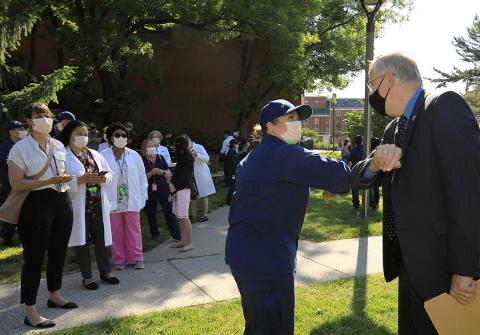
Photo: Chia-Chi Charlie Chang
NIH director Dr. Francis Collins thanked the staff members who made the Covid-19 vaccine program a success, addressing a crowd assembled on May 19 outside the Bldg. 10 B1 cafeteria that housed the immunization clinic since its inception.
“Your efficiency, professionalism, friendliness, sensitivity to everybody’s needs has become famous around here,” Collins said during the event to recognize vaccine clinic staff. “You’ve really done amazing things to set a standard for excellent care. And that’s made us all really proud.”
Since the clinic opened in December, ORS’s Division of Occupational Health and Safety, members of the Public Health Service and many volunteers from across campus administered more than 30,000 doses to NIH employees. During the majority of the clinic, only 20 doses were wasted.
“You are a reminder why this is such an amazing place and such a noble enterprise,” Collins concluded. “You keep the community safe, do great science and make all of us proud to be part of NIH.”
Sense of Community Grew
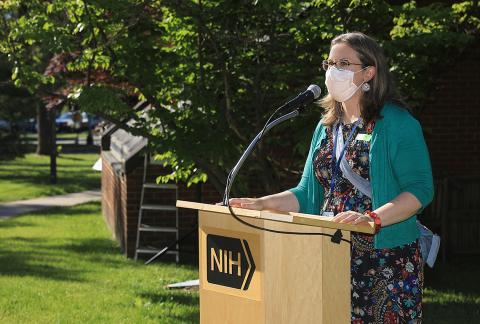
Photo: Chia-Chi Charlie Chang
The clinic opened in late December 2020. At first, there was little else besides a few booths and computers, said Dr. Jessica McCormick-Ell, director of the Division of Occupational Health and Safety, ORS. Thanks to efforts by DOHS, ORS’s Division of Emergency Management, the CC pharmacy and department of clinical research informatics and the PHS Commissioned Corps, the clinic swiftly enhanced its ability to administer vaccines.
McCormick-Ell said that with constant communication and improvement, “we were able to add in appointments, had extremely low wait times, if any, even on days when we have over 300 appointments. The clinic was viewed as a best in class clinic by PHS leadership, and required input from staff with many different backgrounds.”
While Covid-19 cases surged across the country, McCormick-Ell added, the clinic worked to ensure the safety of staff and volunteers as well as those who received immunizations.
“A strong sense of community has developed amongst these persons,” she noted. “I have been so lucky to meet and work with people with extraordinary dedication. We held each other up during this really stressful time, supporting each other in many different ways. I am so grateful to this team, their long hours, dedication to excellence and their expertise.”
Getting the clinic up and running was a complex effort that required many people from across NIH to work together, said Capt. Derek Newcomer, DOHS deputy director.
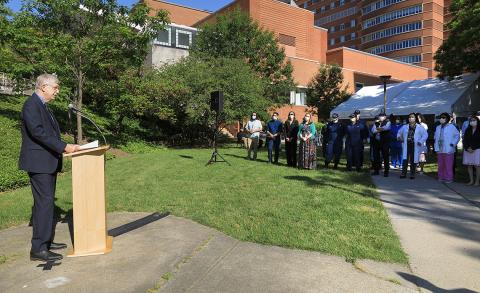
Photo: Chia-Chi Charlie Chang
OMS knows how to vaccinate NIH’ers. Every fall, they run the seasonal influenza immunization program. Despite the experience with the flu clinic, Newcomer said, getting Covid-19 vaccines to employees posed unique challenges. Covid-19 vaccines had to have been given as fast as possible to as many people as possible.
In addition, Pfizer and Moderna vaccinations require two shots. For the Pfizer vaccine, the second dose is administered 21 days after the first dose and, for the Moderna vaccine, the second dose is administered 28 days after the first dose.
There were some days when the clinic was giving out a third—the Johnson and Johnson vaccine, which required only one dose. Staff had to keep track of who got what and when or if they needed to return for a second shot.
As more employees began getting vaccinated outside of NIH, staff noted who received vaccines elsewhere to ensure invitations are sent as quickly as possible to eligible staff who have not yet received a shot.
All In
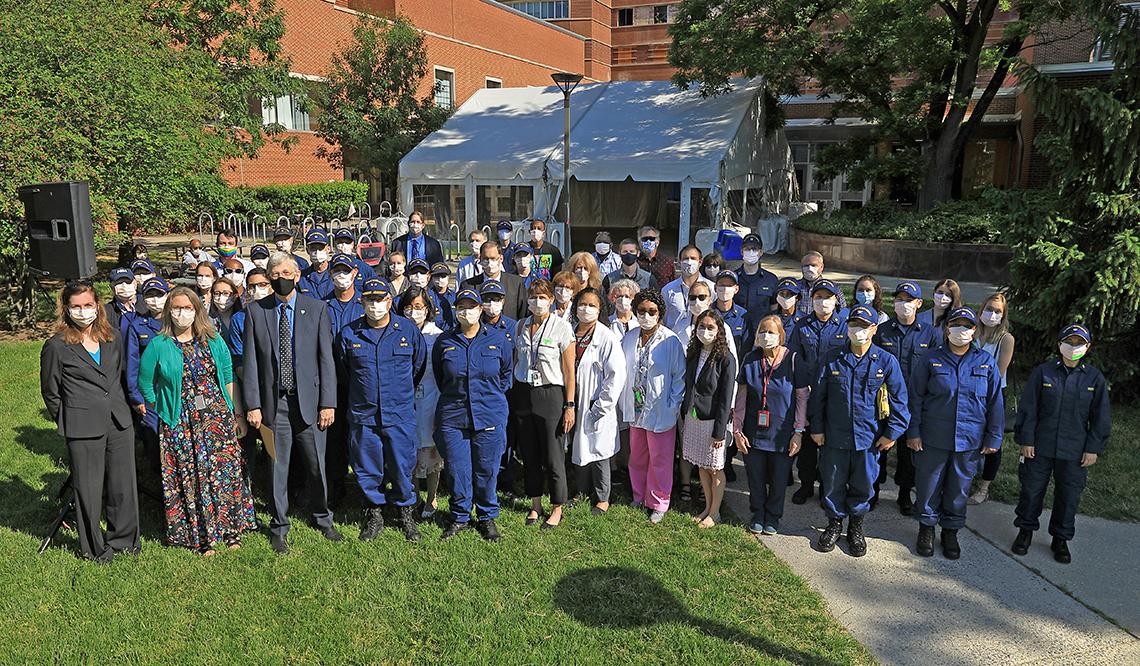
Photo: Chia-Chi Charlie Chang
Each morning before the clinic opened, staff would meet to discuss lessons learned, strategy for the next day and reflect on the meaningful work they did.
“Early on, patients shared heartfelt stories about loved ones dying from Covid-19,” said Newcomer. “The vaccine gave them hope they wouldn’t become a statistic.”
Judy Chan, a nurse practitioner with OMS, works to ensure the clinic runs smoothly.
“I have worked tirelessly above and beyond my scheduled hours to make sure your Covid vaccine clinic runs effectively and smoothly,” she said.
The night before, Chan reviews the next day’s appointments to make sure there are enough supplies and volunteers to administer the vaccines.
She also estimates how many leftover doses there might be at the end of the day. Then, she notifies people on the vaccine waiting list that there are extra doses and schedules them for a walk-in appointment.
Chan said being part of the vaccine program is “so rewarding.” She enjoys working with everyone towards the same goal as a team. “There’s not one day where I dread coming down here,” she remarked. “We’re all in this together.”
‘A Ticket to Freedom’
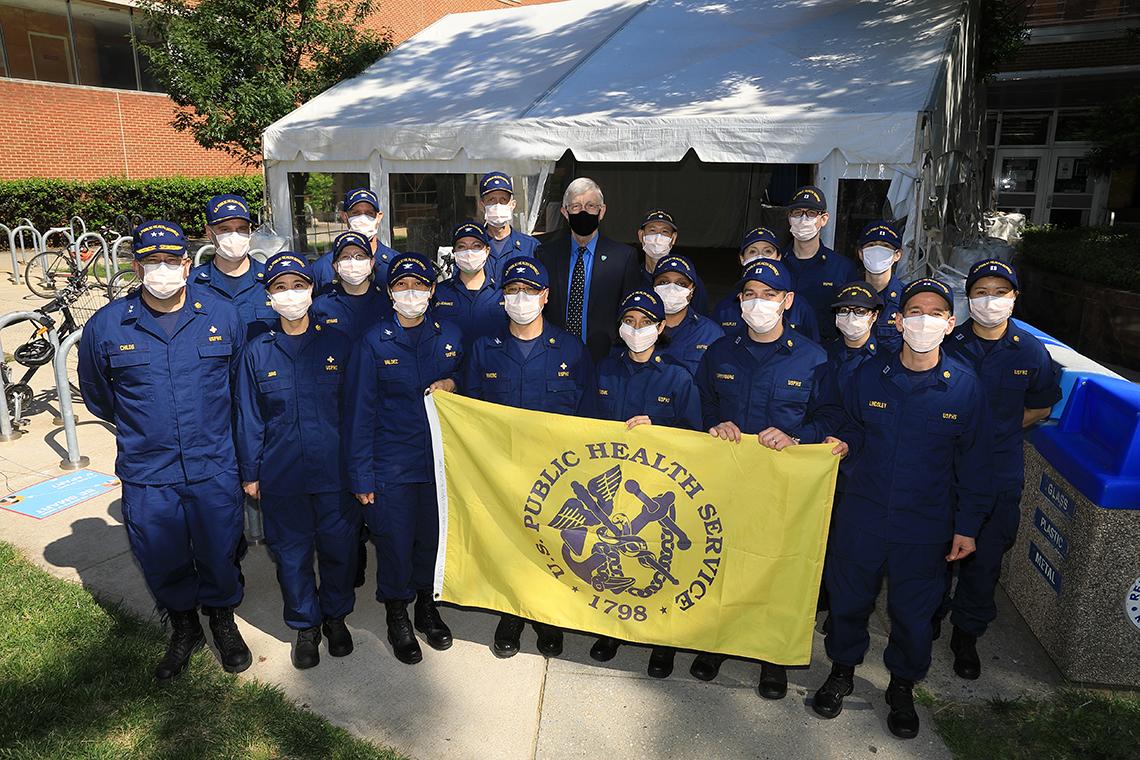
Photo: Chia-Chi Charlie Chang
To assist with the effort, public health officers were deployed to help staff the clinic. Back in December, Radm. Richard Childs, assistant U.S. surgeon general and clinical director of NHLBI’s Division of Intramural Research, asked Capt. Josef Rivero to lead a team of PHS personnel to work in the Covid-19 vaccine clinic.
PHS members usually deploy to other parts of the country in response to natural disasters and public health emergencies, said Rivero, NIH vaccines operations chief. Previously, he deployed to Africa to respond to the Ebola epidemic and to Haiti to respond to an earthquake.
Every patient who got a vaccine got a “ticket to freedom,” he pointed out. Those doses opened the opportunity for people to visit their families.
Rivero’s never seen an effort at NIH where everyone pitched in to get a job done. “It was an honor to be part of a historic mission and take care of our work family,” he said.
Volunteers were also critical to the clinic’s success, said Newcomer. They greeted and checked in patients, provided IT help, came in early, stayed late and gave up their weekends so staff on non-traditional schedules could get vaccinated.
“The clinic was staffed and supported by a diverse group of people from across the NIH community,” he said. “Everyone from mid-level staff to senior leadership staffed booths and gave shots.”
The cafeteria clinic closed June 10. Now through August, OMS offers the vaccine once a week on Thursdays in the OMS Clinic (Bldg. 10, Rm. 6C306) for new employees, fellows and other staff. Schedule online (https://clinweb.cc.nih.gov/cct), call (301) 480-8990 (interpretive services available) or email OMSCOVIDVaccineProgram@mail.nih.gov.
